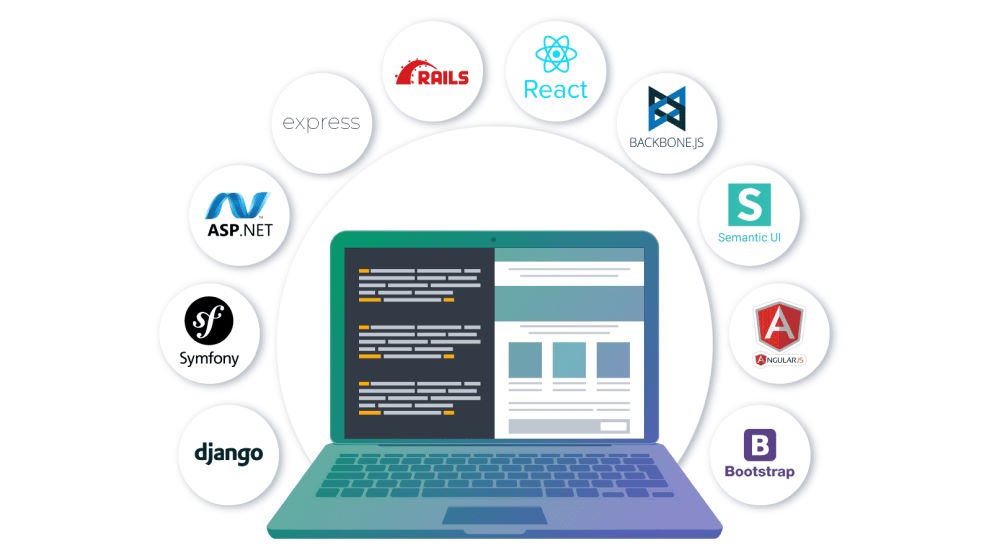Web Application Framework: A Guide to Selecting the Perfect Fit

Content Map
More chaptersIn the app development world, time-to-market plays a decisive role in everything. Delayed implementation of software business ideas leads to an inability to adapt promptly to changes in technology and consumer preferences.
Building robust web applications from scratch, barely relying on the pure development of software engineers, still remains a highly effective method but requires significant effort and resources.
All of the mentioned facts contribute to the strong development of various web development frameworks today. As an indispensable component for any web development project, a web application framework provides a number of pre-built tools and libraries that facilitate web developers’ work.
However, blooming outcomes only come to businesses that choose the right web frameworks. With numerous web application frameworks available in the tech market, which is the right one for your technical requirements?
What Is the Main Use of Web Development Frameworks?

Web application frameworks are a concept used to refer to tools designed to support web development teams throughout the web application development lifecycle. With built-in functions and processes, developers can easily create impressive, high-quality web pages while saving time, budget, and effort.
Here is the breakdown of benefits when using web application frameworks:
- Efficiency: Pre-written components on web frameworks allow users to reuse code at any time without the need to write new ones, saving time and effort in development.
- Productivity: By leveraging built-in functionalities and conventions on web frameworks, developers can focus on core competencies and unique aspects of the development process rather than repeating basic coding tasks.
- Consistency: With a common structure and pattern for development, frameworks ensure consistency across the application, making it easier for multiple developers to collaborate.
- Security: Web application frameworks provide built-in security features and practices, helping the development team protect web apps from common vulnerabilities and cyber security risks.
- Scalability: Web frameworks are designed to scale effectively through scalable and modular architectures despite increasing user demand or growth of applications.
Which Web Framework Is Best for Your Web Apps?
Based on the increasingly diverse needs of developers, there is no shortage of web application frameworks with different characters and features on the market. No best web development framework exists, as what suits one company may not be best for another. Check out the list below, consider your specific project requirements, and choose your perfect fit.
#1 Express
Express is a well-known web application framework for Node.js, which is known for its flexibility and minimalistic approach. The framework is a popular choice for software developers wishing to facilitate the rapid development of server-side web applications and APIs. With a wide range of middleware, users can easily process requests and responses to implement functionalities such as setting up cookies or handling errors.
Express is best suited for:
- Building lightweight and fast web applications
- Developing RESTful APIs
- Microservices architecture
- Prototyping and rapid development
- Single-page applications (SPAs)
#2 Ruby on Rails
Ruby on Rails, also known as Rails, is a popular open-source web application framework written in Ruby. It emphasizes convention over configuration and follows the model-view-controller (MVC) architectural pattern. With a productive and efficient development environment, Rails allows developers to simplify the process of building robust and scalable web applications.
Ruby on Rails is best suited for:
- Rapid development
- Web applications with database integration
- Convention-based development
- Startups and small-to-medium-sized projects
- Building RESTful APIs
#3 Django
Django is a high-level web application framework based on Python. By following the model-view-controller (MVC) architectural pattern, this framework provides tools and features for developers to simplify the web development process, making it a popular choice for large-scale web services of all kinds.
Django is best suited for:
- Rapid development
- Data-driven applications
- Content management systems (CMS)
- Secure web applications
- Scalable and maintainable applications
#4 Angular
Angular is a front-end framework maintained and developed by Google. It is a full-featured framework that offers developers a convenient environment to build dynamic and interactive web applications. As a TypeScript-based framework that follows the component-based architecture, Angular is known for its testing capabilities and powerful data binding.
Angular is best suited for:
- Single-page applications (SPAs)
- Large-scale applications
- Desktop, web, and mobile applications
- Real-time applications
- Enterprise applications
#5 Laravel
Building web applications through the use of Laravel - a PHP-based web application framework is one of the popular options for project teams that want to optimize the development process to create high-quality web applications. With elegant syntax, expressiveness, and developer-friendly features, Laravel does a good job of building modern web applications, including an authentication system.
Laravel is best suited for:
- Rapid application development
- Web applications with database integration
- RESTful APIs
- Content management systems (CMS)
- Scalable applications
#6 React
React is a popular JavaScript library for developing friendly user interfaces. Developed by Facebook, React uses JavaScript as its programming language and focuses mainly on creating reusable UI components. Thanks to its component-based architecture, where complicated user interfaces are broken down into independent components, developers can easily manage and update web apps at any time.
React is best suited for:
- Component-driven development
- Single-page applications (SPAs)
- Mobile applications
- Progressive web applications (PWAs)
- Real-time applications
#7 Vue.js
Vue.js is a progressive JavaScript framework specifically used for web apps’ interfaces. With an open-source library that combines HTML, CSS, and JavaScript, Vue.js allows developers to build interactive web apps using reusable and modular UI components. This framework is easy to use, learn, and integrate with third-party solutions.
Vue.js is best suited for:
- Single-page applications (SPAs)
- Lightweight applications
- Incremental adoption or migrating from legacy systems
- Cross-platform development
- Integrating with existing projects
#8 ASP.NET
ASP.NET is a free and open-source web development framework developed by Microsoft for building dynamic web apps, IOT apps, and mobile backends. Using the .NET framework, ASP.NET provides a wide range of tools and supports various programming languages, including C#, F#, and others.
ASP.NET is best suited for:
- Web APIs
- Windows-based hosting
- Cross-platform development
- Enterprise-level applications
- Large-scale applications
#9 Flask
Flask is a flexible and lightweight web framework written in Python. Flask is famous for its simplicity, ease of use, and excellent performance, which makes it successful for many web applications with minimal boilerplate code on the market. By following the microframework approach, Flask provides developers with essential tools and additional libraries to customize products according to needs.
Flask is best suited for:
- RESTful APIs
- Small to medium-sized projects
- Prototyping and proof of concepts
- Integrating with existing projects
- Custom web applications
#10 Spring
Spring is a well-known web framework that is widely adopted as a Java-based framework for creating enterprise-level web applications. Thanks to its modular and comprehensive infrastructure, the framework helps developers simplify the development process of robust web applications. Spring promotes the use of plain old Java objects (POJOs) and follows the principle of dependency injection.
Spring is best suited for:
- Dependency injection and inversion of control
- Integration with other Java frameworks and libraries
- Testability and unit testing
- Cloud-native and microservices architecture
- RESTful APIs
Things to Consider When Selecting a Web Development Framework

It doesn’t mean that the more popular a web application framework is, the more suitable it will be for a business’s project. Choosing a framework is indeed a daunting task as it requires much technical knowledge and components to consider. The decision of which web framework to choose profoundly impacts the overall success of web applications. Here are four main factors you need to pay special attention to in the framework decision-making process.
Purpose and Project Requirements
Before learning more about the nature and characteristics of web application frameworks, understanding the purpose of your project and its specific requirements is indispensable. Although a framework may have many users, there may be better fits for your business.
Instead of rushing and jumping into a random web framework that’s on the market, take time and consider internal factors such as the type of application you want to build, scalability needs, requirements performance, security considerations, and integration with other systems or technologies. Implementing such things helps businesses have a more comprehensive view of the comprehensive picture and identify strengths and weaknesses, thereby choosing the right frameworks that best suit their needs.
Learning Curve and Developer Experience
Each development team has its own strengths in technical techniques and programming languages. In order to ensure project quality as well as ROI software, businesses should choose web frameworks that are familiar to the existing developers. This creates favorable opportunities for employees to quickly turn pure ideas into high-quality web apps.
Consider the learning curve factor when choosing a less popular web framework. Some frameworks require extensive training, while others are beginner-friendly.
Community Support and Ecosystem
Software developers, even full-stack ones, sometimes encounter difficulties during the product development process. This is where the elements of community support and ecosystem shine. By assessing the size and activity level of the framework’s community, businesses can determine which web frameworks have strong communities.
A strong community that gathers many experts worldwide is considered a valuable source of knowledge and experience, offering resources, libraries, and extensions, along with timely bug fixes and updates. As a long-term support ecosystem, coders quickly find solutions to challenges ahead and accelerate product time-to-market.
Performance and Scalability
Web applications are always changing based on user needs and real-time project conditions. That is why a specific framework needs to be scalable to scale and adapt easily to changing requirements.
It is recommended to review the performance benchmarks and scalability features of the framework before proceeding with implementation. Whether the framework can handle high traffic loads or integrate with distributed systems if needed, all have a strong impact on the sustainable success of web applications.
Wrapping Up
The success of a web app project comes from the most minor things. Although it only serves as a tool to help simplify and optimize the development process, businesses can enhance code quality and build robust web applications efficiently with the right web framework.
However, if you are struggling to form a complete team for web application development, Orient Software can help. We are an outsourcing company with extensive experience operating in the field of technology. For nearly two decades, Orient has successfully collaborated with hundreds of large and small projects both domestically and internationally, consistently achieving high levels of customer satisfaction regardless of industry.
Businesses can connect with us for various services, including web application development, custom software development, UI/UX design, artificial intelligence, etc. It is time to take your project to the next step. Contact us now.







